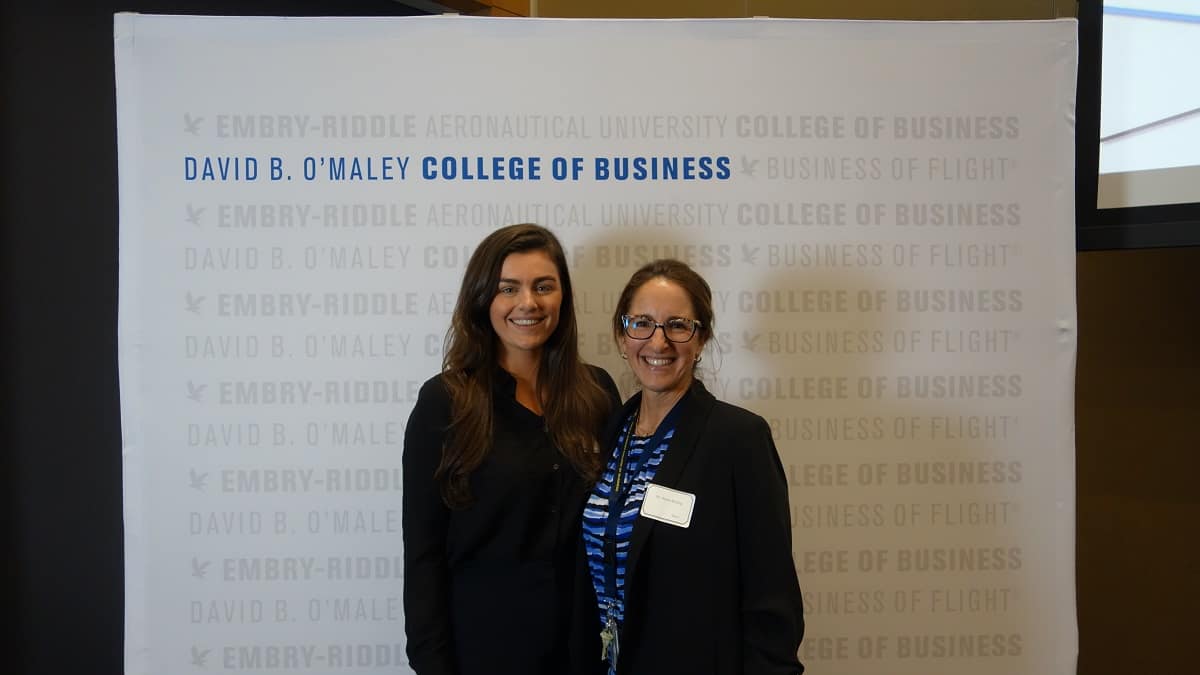Student Project Provides Real-World Aviation Business Experience

The economic impact of bringing a new air carrier, Avelo Airlines, to Daytona Beach International Airport (DAB) was estimated to be $2.4 million, less than six months after the new service was launched in 2023.
“Those benefits come in the form of payrolls, hotel stays, car rentals, restaurant patronage [and more],” Cyrus Callum, A.A.E., ACE, Volusia County’s director of aviation and economic resources, told the Daytona Beach News-Journal last fall. “Our (airport) concession revenues have gone through the roof, as well as our parking revenues.”
Joan Dwyer, a commercial pilot and a junior at Embry-Riddle Aeronautical University, worked with two airport executives to learn how Avelo Airlines was added to Daytona Beach’s air carrier service and how that example could inform other such efforts at similar airports nationwide.
The project “gave me a look inside the operational aspects of an airport and [Federal Aviation Regulations] Part 139 operations — something I have never been exposed to,” said Dwyer, a Madison, Connecticut, native who worked at Guardian Jet for four years before enrolling in Embry-Riddle’s Bachelor of Science in Aeronautics degree program. “Meeting with airport executives and understanding the funding process to attract new carriers was an invaluable experience for my career.”
Dr. Maria F. Rickling, associate professor of Accounting at Embry-Riddle’s David B. O’Maley College of Business, conceived the airport project and mentored Dwyer.
“Real-world learning experiences that significantly engage the student are a cornerstone of a quality higher education learning experience,” Rickling noted. “They allow for the extension and application of theoretical concepts in actual scenarios. We are incredibly thankful to the airport for their willingness to work with us and hope to continue to partner with them on future projects.”
Embry-Riddle alumna Karen Feaster, A.A.E., ACE, IACE (’89), airport director, has been instrumental in facilitating student learning experiences during her 32-year tenure at the airport, Rickling noted. The two executives who worked with Dwyer and Rickling were Embry-Riddle alumnus Mihai Smighelschi, A.A.E., MBA-A (’93, ’96), airport manager for properties and administration, and Joanne Magley, airport manager for air service marketing and customer experience.
“Managing an airport is a lot more complex than it appears,” said Smighelschi. “It can be an eye-opening experience for a student to dive deep into just one aspect of airport management — air service development, for example — and to understand what it takes for an airline to start a new route at the airport and the powerful impact the new service has on the community.”
Understanding Air Carrier Recruitment
The idea for the project was born after Rickling read a news article about the role that an airport plays in the economic health of a community and how those communities are enticing airlines to serve their airports.
Smaller cities with non-hub airports offer incentive programs such as “minimum revenue guarantees,” and/or they waive airport fees to help airlines offset startup costs and/or mitigate any potential losses if the route doesn’t pan out, Rickling explained.
The Daytona Beach airport seemed like a perfect real-life case study.
To complete her project with the local airport, Dwyer had to learn about complex federal regulations, economic impact studies, and airport accounting rules and reporting.
Tactics for bringing new flight service to a region are governed by policies put forth in the FAA’s Air Carrier Incentive Program (ACIPs), she learned.
For instance, under the regulations, an airport is not permitted to use its own revenue to make minimum revenue guarantee payments, but for a limited time, it can waive airport fees and include the airlines in specific marketing and advertising campaigns. However, “community-sponsored” incentives are far more flexible and can include minimum revenue guarantee payments and providing financial assistance to the airline for a larger scope of marketing initiatives, Rickling said.
Because the Daytona Beach airport is county-owned, the county serves as its community sponsor. However, the airport is not taxpayer-funded; its FAA mandate is to be “as self-sustaining as possible under the circumstances existing at the particular airport.”
Conversations with the airport suggested that over the longer term, it may be a best practice for local businesses to form a consortium to financially support the airport’s air service incentive program, Rickling said. Local businesses that benefit from a successful airport would collectively contribute to an airport fund to support air carrier service plans allowing the most breadth and flexibility in financing increased air service as permitted under FAA guidelines.
After studying all the regulatory options and the Avelo Airlines case, Dwyer and Rickling concluded that community-sponsored incentives “allow the most breadth and flexibility in financing increased air service.” They noted further that “creating a consortium comprised of local companies to serve as the provider of community-sponsored incentives is a best practice.”
Dwyer, who sold pre-owned business jets for Guardian Jet, a Part 91 operation under Federal Aviation Regulations, before arriving at Embry-Riddle, has now accepted a full-time position at Jet Aviation selling charter flights under Part 135 operations. Combined with her insights into the Daytona Beach airport’s Part 139 operation, she has gained knowledge of the federal rules for civil aviation, non-scheduled air charters and scheduled airline operations, respectively.
“My goal is to become a well-rounded aviation professional who can provide a breadth of knowledge to my future clients,” she said.
Working with business clients before graduation is essential for career success, said Dr. Shanan Gibson, dean of the David B. O’Maley College of Business. “By working with today’s established industry leaders,” she said, “students prepare to become leaders in their own right in the future.”
Gibson commended her college’s Philanthropy Council for supporting the project.

 Ginger Pinholster
Ginger Pinholster